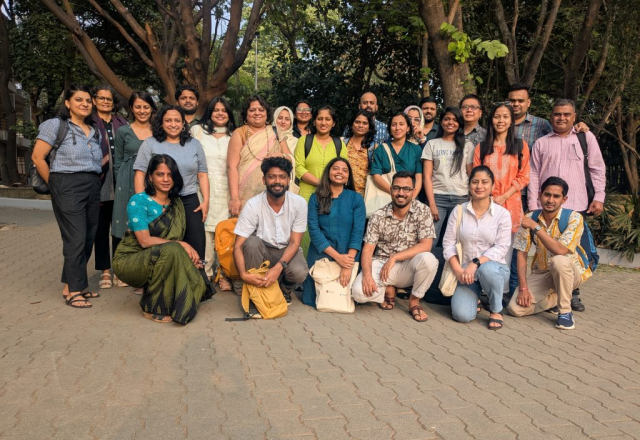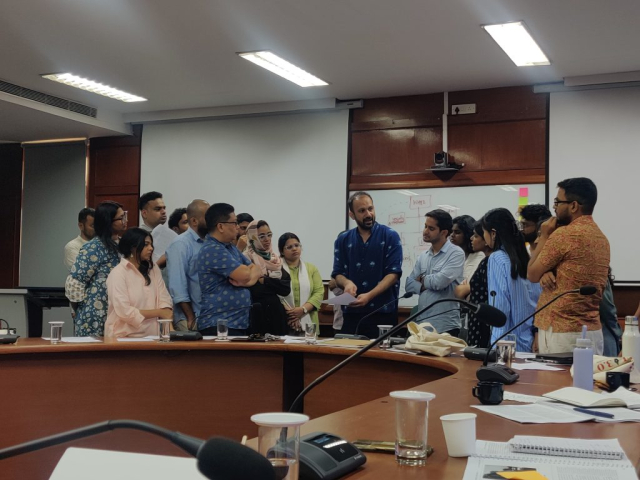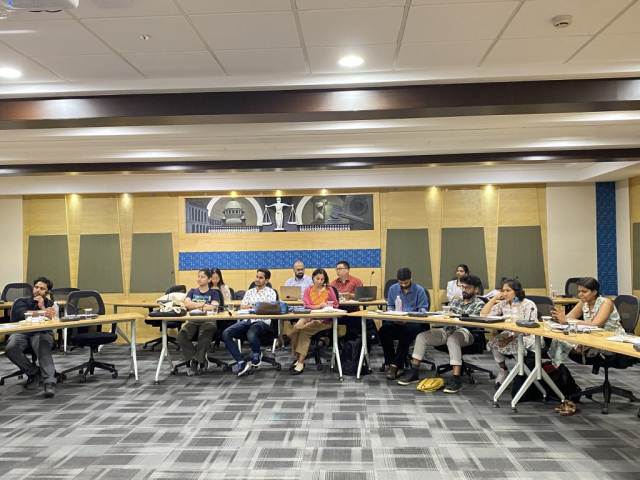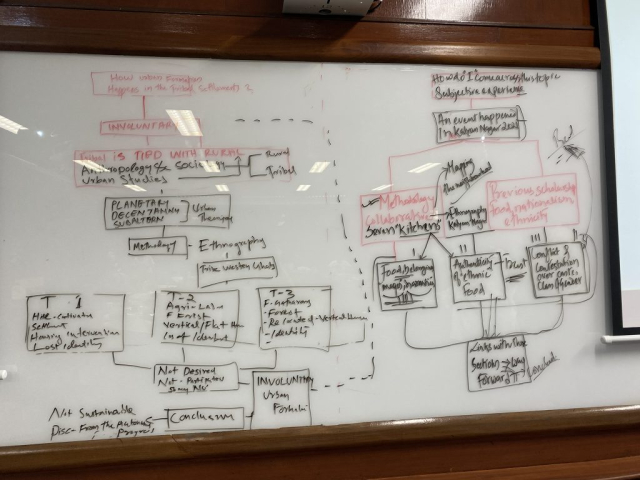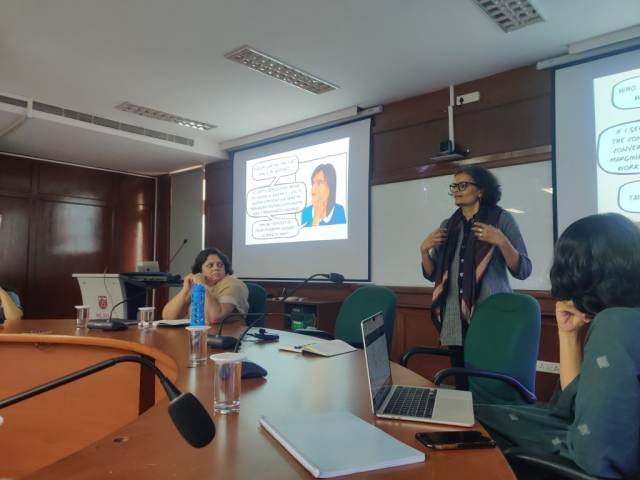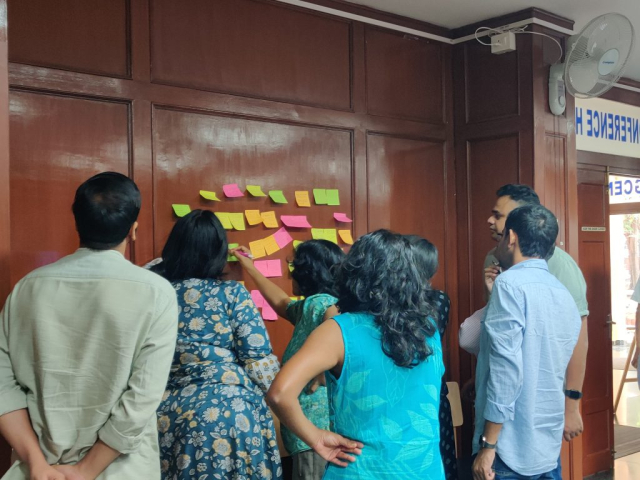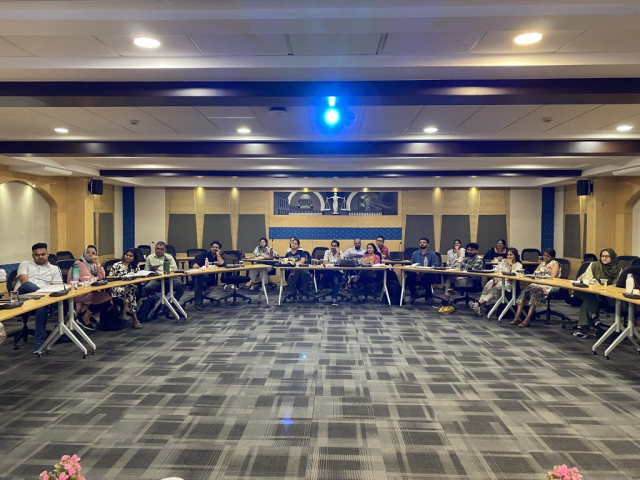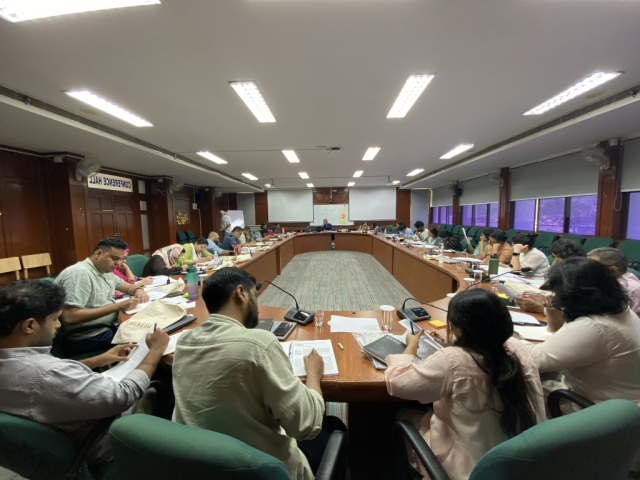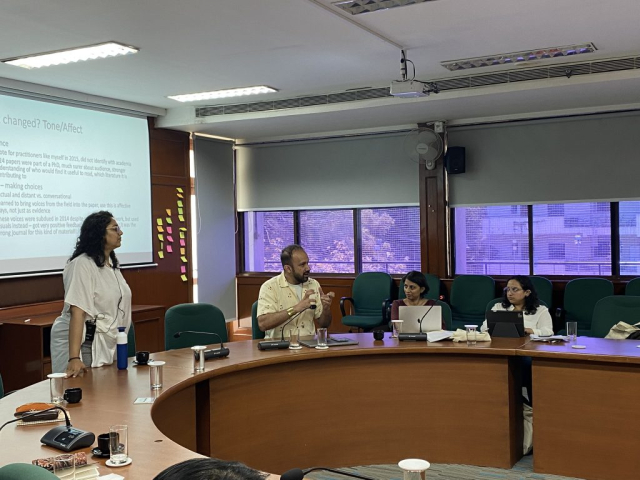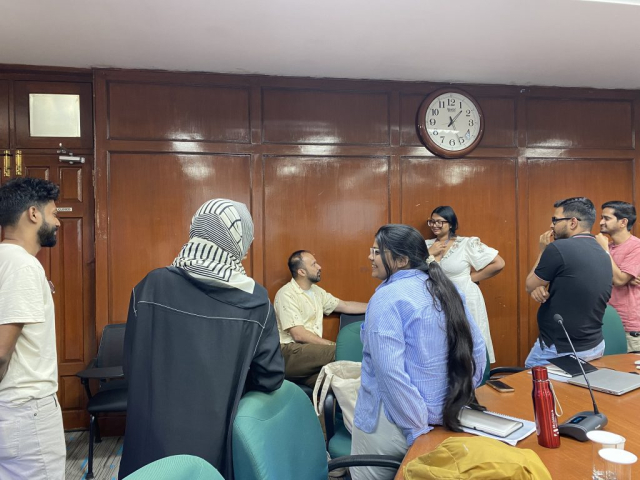Writing Urban India Fellowship: Reflections from the Workshop | April 7-11, 2025
May 27, 2025
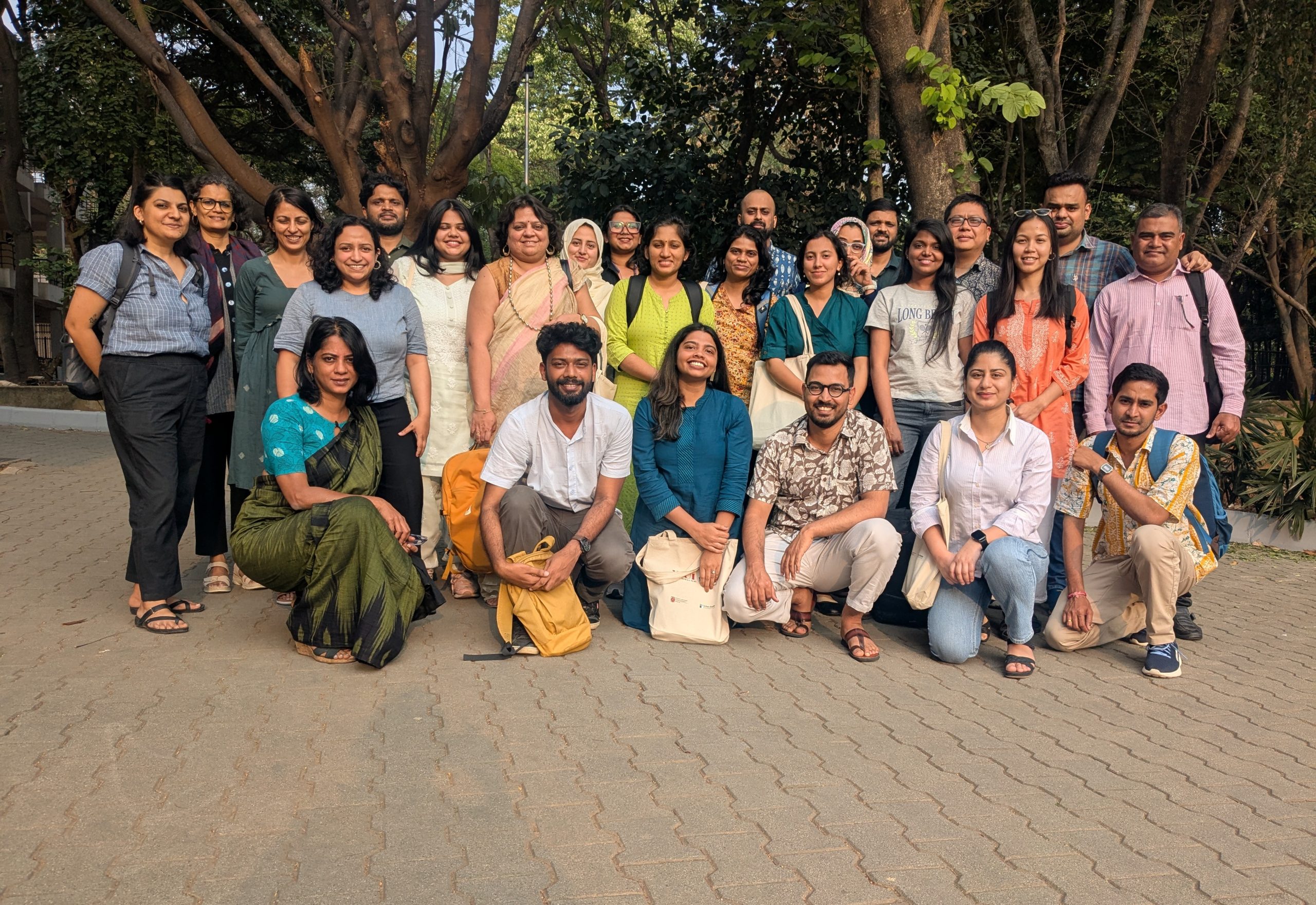 The HUPA Chair for Urban Poor and the Law at NLSIU, in collaboration with Writing Urban India Collective and the Urban Studies Foundation (UK), is hosting the third iteration of the Writing Urban India Fellowship in 2025.
The HUPA Chair for Urban Poor and the Law at NLSIU, in collaboration with Writing Urban India Collective and the Urban Studies Foundation (UK), is hosting the third iteration of the Writing Urban India Fellowship in 2025.
The Writing Urban India Fellowship Round 3 (WUI 3.0) is a mentoring initiative to nurture early career scholars in writing and publishing on urbanisation in India. The initiative aims to enable candidates with the skills and knowledge required to produce a structured writing output that is academic in nature – through capacity-building workshops, seminars and one-to-one mentorship. The programme involves offline and online interactions based on feasibility. The first two iterations of the Writing Urban India Fellowship were anchored by the Centre for Policy Research.
The Idea for the Fellowship
A group of academic peers—friends and collaborators over the years—had been working together on various research projects and contributing to the review of urban affairs in the Economic & Political Weekly. Through their involvement in the field, they noticed a clear gap: a lack of writing support for researchers in India.
At the same time, the Urban Studies Foundation, which publishes the Urban Studies Journal, approached them with a concern. They had previously run a successful writing support programme in China and were interested in doing something similar in India.
The issue they faced was that while many papers were being written about India, few were coming from researchers based in India. And even when submissions did come in, the writing quality often didn’t meet journal standards—despite the fact that the ideas and data had great potential.
Building on their previous collaborations and collective experiences, a network of urban academicians came together to design and implement a unique writing fellowship to suit the Indian academic context. The writing fellowship was essentially designed to pair early-career scholars with more experienced mentors.
The Previous Cohorts
The first cohort launched during the COVID-19 pandemic and was conducted entirely online. Initially, the criteria for selection were broad—participants didn’t necessarily have to be pursuing PhDs or already have written drafts. However, they quickly learned that many fellows were unclear about what a ‘writing’ fellowship entailed. Some had great ideas but not enough data or material to develop it into a full paper within the fellowship timeframe.
Taking these lessons into account, the second cohort focussed on selecting participants who were further along in their research journey—those who had collected data and had clearer writing goals. The fellows formed a strong peer network—supporting each other, offering feedback, and developing complementary skills.
This experience highlighted the importance of peer learning. While mentor-mentee relationships are crucial, mentors often have limited time due to teaching and other responsibilities. In contrast, peers navigating the writing process together can provide sustained support, encouragement, and insight.
The Current Cohort (2025)
These lessons fed into the design of the latest cohort, which is the first to include in-person interactions. The programme, this year, is “bookended” by two in-person meetings: one at the beginning and one at the end of the fellowship. These sessions aim to foster a sense of community, kickstart peer support networks, and set the stage for ongoing collaborations. Participants also have the advantage of forming smaller interest-based groups, organically building connections beyond the formal structure.
A Note from our Organisers
Dr. Mukta Naik, Lead – Policy, Centre for Sustainable Urban Livelihoods, National Institute of Urban Affairs (NIUA):
“At its core, the programme remains a one-on-one mentorship model with light-touch group elements. The focus is on helping fellows improve writing structure, style, and clarity—areas that often receive less attention in traditional academic supervision. This time around, the cohort is intentionally more mature. Most participants have clear drafts and a strong sense of what they want to write.
Overall, the project is an ongoing learning experience—for mentors and mentees alike. It is as much about identifying and supporting motivated writers as it is about navigating the structural challenges of academic publishing. The stakes are high: in today’s academic world, publishing often directly affects career prospects. Fellows carry that pressure with them, and the programme hopes to ease that burden by offering thoughtful guidance, a strong peer network, and the time and space to grow as writers.”
Sushmita Pati, Associate Professor, NLSIU:
“WUI is a great opportunity for us to listen to new ideas on urban research from younger scholars and engage with them. The five-day workshop turned out to be a great space for all of us to speak about our writing troubles, annoyances and also ways of getting around those to become better writers!”
Reflections from the Fellows
Paper title (working title): Processes of socio-spatial transformation in the City of Ahmedabad
“Throughout my academic journey, writing to publish has been like pulling those wobbly teeth – slow, painful, and somehow always more complicated than it should be. It’s wild how we’re expected to just know how to do it, when in reality, research writing is its own beast and rarely acknowledged as something that needs real guidance. The fellowship offered the simple but powerful recognition that “we realise writing is hard, and here’s how we can help.” My aim is to use this opportunity to better understand the craft of research writing – how to write with purpose, how to write to sharpen arguments, how to write to tell more compelling stories, and how to write to make the “excellent first drafts” (quoting Noora, my fellow WUI Fellow) turn into publishable outputs. I’m also hoping to fine-tune my intuitions and find my voice in the process, to learn how to write in ways that feel true to the work I’m doing, and to myself.
The Workshop was enriching and inspiring to say the least. The space created through interactions with mentors and fellows felt like stepping out of the usual academic haze and into something more grounded, more collaborative. It was a healthy blend of guidance by the mentors and hands-on engagement, making the experience both insightful and practical. Writing wasn’t a solitary struggle but something collective, something shared. It instilled in me a newfound confidence, empowering me to approach my writing with more assurance and clarity.”
Paper Title: Involuntary Urbanisation: Settlement Transformations among Tribal Communities in the Western Ghats
“I am a researcher trained to explore the social, political, and economic dynamics in rural and tribal settings. While working among tribal communities in the Western Ghats of Kerala—focussing on their housing and settlement transformations—I realised that understanding theories of urbanisation, particularly Southern urban theories, is essential to grasp the complexities of these changes. This realisation prompted me to apply for this fellowship. I am keen to engage with urban scholars and practitioners to better understand how urban formations are unfolding in rural and tribal geographies, particularly within the Indian context.
The first writing workshop held at the National Law School of India University from April 6 to 11, 2025, was an intellectually enriching and eye-opening experience. It exposed me to the wide spectrum of issues and themes shaping urban studies in India today. What stood out most were the sessions on reading critically and navigating the writing–rewriting process, led by seasoned scholars and practitioners. For me, it was a powerful journey of unlearning and re-learning that reshaped how I approach both reading and writing.”
Paper title: Gender, Food, Community and Urban Space in Bengaluru
“I joined this fellowship to have a clear idea of how to approach a few of the research questions from the paper. I hope I will benefit from the mentors’ comments and suggestions.
The workshop was really thought-provoking the way the mentors and teams called for rigorous academic exercise of writing a paper on how to approach a particular area of research. It was really helpful for me.”
Paper title (working title): Sonic Urbanism in Aizawl: Sounding the Everyday City in Northeast India
“My PhD supervisor often tells me ‘you write too little. Be more forthcoming with your writing.’ My reason for applying to the fellowship is precisely this, I write too less. And I hope to achieve the intended flourish in my writing through this fellowship.
The workshop was eye opening in a number of ways. The sessions by Gautam Bhan (Indian Institute for Human Settlements) on the purpose of structure, tone, construction and affect in the matters of writing proved crucial so much so that I’ve become conscious and aware to incorporate them as I read and write. Anwesha Ghosh’s (NLSIU) talk on how to structure an argument unburdened the many perils of a student’s dilemma in framing a cohesive argument. Partha Mukhopadhyay’s (Centre for Policy Research) insistence on writing as sense-making and the importance of actors in ethnography has remained with me. I found Dhivya Janarthanan’s (NLSIU) lecture on working and engaging with theory so sedimented and interesting. On the whole, I enjoyed myself thoroughly as I listened with intent to the lectures and made notes to reflect on them over the intervening months. The stay, food, camaraderie, and most importantly the WUI team was wonderful. Everything was cast so supremely well.”
Paper Title: Safeguarding Prerna Sthal: Dalit Women, The Police and Reproduction of Anti-Caste Spaces in The City
“Usually, research on gender and caste is confined to the disciplines of Feminism and Dalit studies, limiting its potential to tell us about ‘urban marginalisation’ and ‘urban inequalities.’ My research, an ethnographic exploration of Dalit women’s life worlds in an urban village in Delhi, contributes to the wider research on urban villages, shifting from anchors of land settlements, rural-to-urban transition, and gendered perspectives.
Through Professor Susmita Pati’s guidance, I have not only found affirmation in the scope of my work but also motivation to build on my socio-anthropological research in urban studies. I aim to publish a piece in a high-ranking journal by the end of this fellowship as a payback to the endearing faith WUI 3.0 has shown in my research on Dalit women in urban spaces.
A week at NLS under the guidance of WUI 3.0 mentors exposed us to academic hands-on tools, techniques, and affirmations to build on our research. Mentors Gautam Bhan (Indian Institute for Human Settlements), Champaka Rajagopal(Centre for Policy Research), Sushmita Pati (NLSIU), Neha Sami (Indian Institute for Human Settlements), J Devika (Centre for Development Studies), and Anwesha Ghosh (NLSIU) guided us to write in structured parts and make connections across our research. Moreover, the hospitality and care shown towards us by the team were the highlight of the fellowship for me, as it reinstated my faith in building more channels of care and community. I was able to think through my research in mind maps post-orientation week, which tells a lot about what good guidance can do for early PhD researchers. The key takeaway has been to locate my work in urban studies, how it contributes, and what are the ways I can refine this contribution for a wider knowledge production on urban studies in India. The highlight was also the bus rides to the campus every day, where fellows connected and opened our life worlds to each other, making each other understand why we do what we do and the importance of it. I am extremely thankful to NLS and the Urban Foundation for this valuable opportunity.”


